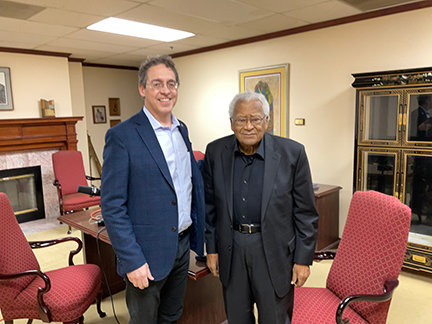By Bill Freeman

January 15, marked as Rev. Dr. Martin Luther King Jr. Day in the United States, a day when our nation collectively reflects on the profound impact of a man who stood as a beacon for change. MLK Day serves as a reminder that one individual can ignite transformation, paving the way for a more just and equal society. As we’ve recently commemorated that day, I thought it important to talk about the essence of Martin Luther King Jr.’s legacy, particularly his unwavering commitment to nonviolent civil disobedience – a philosophy that still resonates and beckons us towards a more compassionate and just future.
Dr. Martin Luther King Jr., a visionary leader, not only advocated for civil rights but embodied the principles of nonviolent civil disobedience. His commitment to this philosophy extended beyond rhetoric; it became the cornerstone of his activism. Nonviolent civil disobedience, as defined by Sciencedirect.com, involves individuals refusing to obey laws for moral or philosophical reasons. For Dr. King, this approach wasn’t merely a tactic but a way of life. He preached that change could be achieved through nonviolence, challenging oppressive systems without resorting to aggression.
In this journey towards justice, MLK found a kindred spirit in Rev. James Lawson. Their profound friendship was cemented by a shared commitment to nonviolent activism. In a recent interview hosted by Lee Camp on his “No Small Endeavor” podcast, Rev. Lawson speaks of being influenced by his faith and following the teachings of Jesus Christ. In doing so, he believed – and still believes – that violence had no place in their pursuit of justice. His dedication to nonviolent communication and civil disobedience mirrored MLK’s principles. Together, they envisioned a nation where transformation could occur without bloodshed or hatred.
Rev. Lawson said in the interview: “I do not know how many times Dr. King and I conferred by phone. I do not know how many times King and I took walks at Penn Center or in Georgia at our staff retreats, our board retreats – when he and I would take walks for the purpose of talking…and wanting me to bounce against it so that he could feel, uh, that he was moving in the right direction.”
The connection between MLK and Lawson ran deep, rooted in the belief that nonviolent means could bring about substantive change. Their partnership and the strength of their shared vision was in the acknowledgment that true change could only arise from a commitment to nonviolence. Lawson had been with his friend only hours before MLK was assassinated. It was a great loss – not only for Lawson but for all of us who believe in the Dream so well described by MLK.
As we reflect on the teachings of these great leaders, it is disheartening to see the current state of our nation. Rev. Bernice King, daughter of Dr. Martin Luther King, Jr., warns that we are at a critical juncture, witnessing unprecedented loss of human life and escalating racial injustices. Despite her continued dream of a more compassionate world, the reality is that we seem to be straying from the path envisioned by her father and Rev. Lawson. She added that the study and practice of her father’s philosophy of nonviolence could teach people how to live together peacefully – and reminded us that we all have a choice in “whether we will continue to diminish and devastate humanity and the earth or if we will become co-conspirators to shift the cultural climate throughout our nation and world.”
Rev. Lawson’s perspective too, sheds light on the depth of the challenges we face. Despair still grips him as he reflects on the assassinations of five remarkable individuals in the 1960s – a president, a senator, Malcolm X, Medgar Evers, and Dr. Martin Luther King, Jr. Rev. Lawson’s despair emanates from the recognition that these assassinations disrupted a transformative movement, halting the collaboration between Dr. Martin Luther King Jr. and Malcolm X, preventing a more profound impact on the nation. He added, “It did some transformation anyway, but didn’t do all that it could have done and would’ve done.”
As we assess how far we have come, there is also a perceivable sense that the journey is far from over. Rev. James Lawson, echoing MLK’s sentiments, reminds us that while progress has been made, forces opposing transformation still persist. The visionaries of the past laid the foundation for change through nonviolent means, advocating for a society where justice prevails without the need for violence or aggression.
Let us reflect on the words of Dr. Martin Luther King Jr., who once said, “Darkness cannot drive out darkness; only light can do that. Hate cannot drive out hate; only love can do that.”
The enduring message is clear – the path to real peace and security lies in adopting the principles of nonviolent civil disobedience. It is a call to action, urging us to learn from the wisdom of those who envisioned a world where justice triumphs through the power of love and nonviolence.

